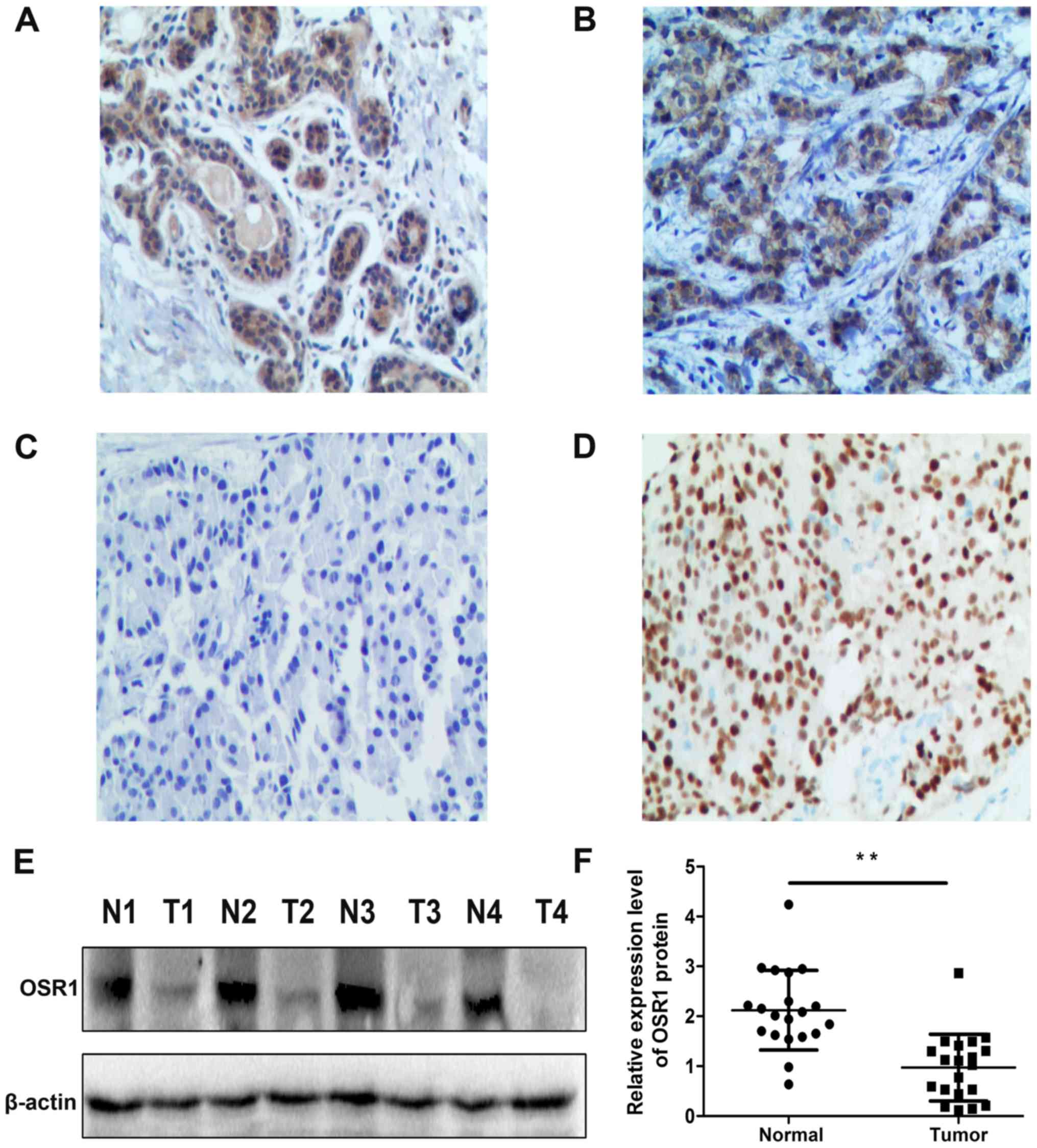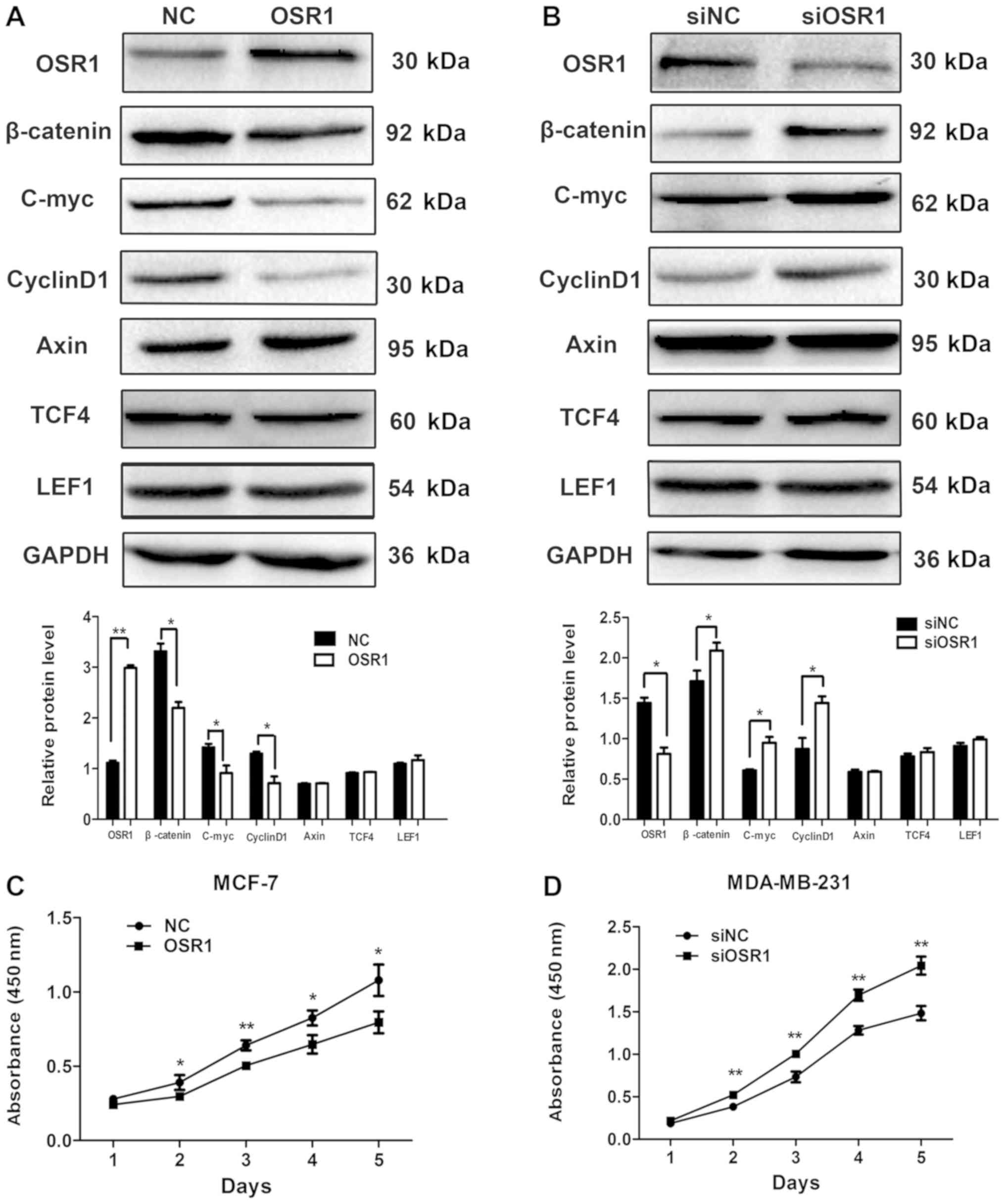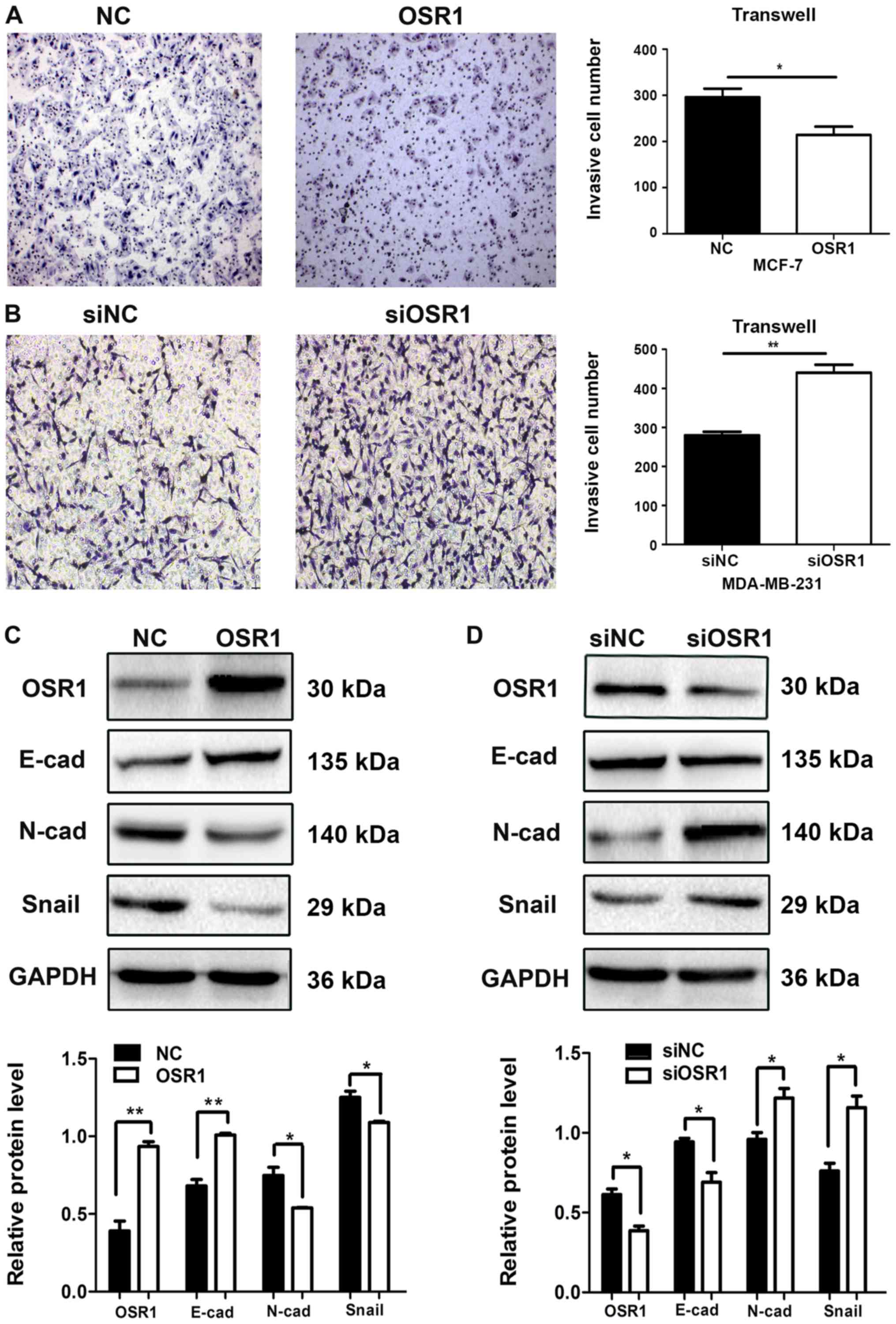|
1
|
Cadoo KA, Fornier MN and Morris PG:
Biological subtypes of breast cancer: Current concepts and
implications for recurrence patterns. Q J Nucl Med Mol Imaging.
57:312–321. 2013.PubMed/NCBI
|
|
2
|
Yip CH and Rhodes A: Estrogen and
progesterone receptors in breast cancer. Future Oncol.
10:2293–2301. 2014. View Article : Google Scholar : PubMed/NCBI
|
|
3
|
Fidler IJ and Kripke ML: Genomic analysis
of primary tumors does not address the prevalence of metastatic
cells in the population. Nat Genet. 34:232003. View Article : Google Scholar : PubMed/NCBI
|
|
4
|
Cedolini C, Bertozzi S, Londero AP,
Bernardi S, Seriau L, Concina S, Cattin F and Risaliti A: Type of
breast cancer diagnosis, screening, and survival. Clin Breast
Cancer. 14:235–240. 2014. View Article : Google Scholar : PubMed/NCBI
|
|
5
|
Carey LA, Perou CM, Livasy CA, Dressler
LG, Cowan D, Conway K, Karaca G, Troester MA, Tse CK, Edmiston S,
et al: Race, breast cancer subtypes, and survival in the carolina
breast cancer study. JAMA. 295:2492–2502. 2006. View Article : Google Scholar : PubMed/NCBI
|
|
6
|
McNamara KM, Moore NL, Hickey TE, Sasano H
and Tilley WD: Complexities of androgen receptor signalling in
breast cancer. Endocr Relat Cancer. 21:T161–T181. 2014. View Article : Google Scholar : PubMed/NCBI
|
|
7
|
Katoh M: Molecular cloning and
characterization of OSR1 on human chromosome 2p24. Int J Mol Med.
10:221–225. 2002.PubMed/NCBI
|
|
8
|
James RG and Schultheiss TM: Bmp signaling
promotes intermediate mesoderm gene expression in a dose-dependent,
cell-autonomous and translation-dependent manner. Dev Biol.
288:113–125. 2005. View Article : Google Scholar : PubMed/NCBI
|
|
9
|
Mae S, Shirasawa S, Yoshie S, Sato F,
Kanoh Y, Ichikawa H, Yokoyama T, Yue F, Tomotsune D and Sasaki K:
Combination of small molecules enhances differentiation of mouse
embryonic stem cells into intermediate mesoderm through
BMP7-positive cells. Biochem Biophys Res Commun. 393:877–882. 2010.
View Article : Google Scholar : PubMed/NCBI
|
|
10
|
Verlinden L, Kriebitzsch C, Eelen G, Camp
MV, Leyssens C, Tan BK, Beullens I and Verstuyf A: The odd-skipped
related genes Osr1 and Osr2 are induced by 1,25-dihydroxyvitamin
D3. J Steroid Biochem Mol Biol. 136:94–97. 2013. View Article : Google Scholar : PubMed/NCBI
|
|
11
|
Yamauchi M, Kawai S, Kato T, Ooshima T and
Amano A: Odd-skipped related 1 gene expression is regulated by
Runx2 and Ikzf1 transcription factors. Gene. 426:81–90. 2008.
View Article : Google Scholar : PubMed/NCBI
|
|
12
|
Terashima AV, Mudumana SP and Drummond IA:
Odd skipped related 1 is a negative feedback regulator of
nodal-induced endoderm development. Dev Dyn. 243:1571–1580. 2014.
View Article : Google Scholar : PubMed/NCBI
|
|
13
|
Liu H, Lan Y, Xu J, Chang CF, Brugmann SA
and Jiang R: Odd-skipped related-1 controls neural crest
chondrogenesis during tongue development. Proc Natl Acad Sci USA.
110:18555–18560. 2013. View Article : Google Scholar : PubMed/NCBI
|
|
14
|
Wang Q, Lan Y, Cho ES, Maltby KM and Jiang
R: Odd-skipped related 1 (Odd 1) is an essential regulator of heart
and urogenital development. Dev Biol. 288:582–594. 2005. View Article : Google Scholar : PubMed/NCBI
|
|
15
|
Tena JJ, Neto A, de la Calle-Mustienes E,
Bras-Pereira C, Casares F and Gómez-Skarmeta JL: Odd-skipped genes
encode repressors that control kidney development. Dev Biol.
301:518–531. 2007. View Article : Google Scholar : PubMed/NCBI
|
|
16
|
Stricker S, Mathia S, Haupt J, Seemann P,
Meier J and Mundlos S: Odd-skipped related genes regulate
differentiation of embryonic limb mesenchyme and bone marrow
mesenchymal stromal cells. Stem Cells Dev. 21:623–633. 2012.
View Article : Google Scholar : PubMed/NCBI
|
|
17
|
James RG, Kamei CN, Wang Q, Jiang R and
Schultheiss TM: Odd-skipped related 1 is required for development
of the metanephric kidney and regulates formation and
differentiation of kidney precursor cells. Development.
133:2995–3004. 2006. View Article : Google Scholar : PubMed/NCBI
|
|
18
|
Zhang Y, Yuan Y, Liang P, Guo X, Ying Y,
Shu XS, Gao M Jr and Cheng Y: OSR1 is a novel epigenetic silenced
tumor suppressor regulating invasion and proliferation in renal
cell carcinoma. Oncotarget. 8:30008–30018. 2017. View Article : Google Scholar : PubMed/NCBI
|
|
19
|
Otani K, Dong Y, Li X, Lu J, Zhang N, Xu
L, Go MYY, Ng EKW, Arakawa T, Chan FKL, et al: Odd-skipped related
1 is a novel tumour suppressor gene and a potential prognostic
biomarker in gastric cancer. J Pathol. 234:302–315. 2014.
View Article : Google Scholar : PubMed/NCBI
|
|
20
|
Xie XM, Zhang ZY, Yang LH, Yang DL, Tang
N, Zhao HY, Xu HT, Li QC and Wang EH: Aberrant hypermethylation and
reduced expression of disabled-2 promote the development of lung
cancers. Int J Oncol. 43:1636–1642. 2013. View Article : Google Scholar : PubMed/NCBI
|
|
21
|
Xu HT, Yang LH, Li QC, Liu SL, Liu D, Xie
XM and Wang EH: Disabled-2 and Axin are concurrently colocalized
and underexpressed in lung cancers. Hum Pathol. 42:1491–1498. 2011.
View Article : Google Scholar : PubMed/NCBI
|
|
22
|
Allison KH, Brogi E, Ellis LO, et al: WHO
Classification of Tumours of Breast Tumors. (5th). IARC. (Lyon,
France). 2019.
|
|
23
|
Gabriel NH, Stephen BE and Armando G: New
and important changes in the TNM staging system for breast cancer.
Am Soc Clin Oncol Educ Book. 38:457–467. 2018.PubMed/NCBI
|
|
24
|
Chandrashekar DS, Bashel B, Balasubramanya
SAH, Creighton CJ, Ponce-Rodriguez I, Chakravarthi BVSK and
Varambally S: UALCAN: A portal for facilitating tumor subgroup gene
expression and survival analyses. Neoplasia. 19:649–658. 2017.
View Article : Google Scholar : PubMed/NCBI
|
|
25
|
Uhlen M, Zhang C, Lee S, Sjöstedt E,
Fagerberg L, Bidkhori G, Benfeitas R, Arif M, Liu Z, Edfors F, et
al: A pathology atlas of the human cancer transcriptome. Science.
357:eaan25072017. View Article : Google Scholar : PubMed/NCBI
|
|
26
|
Wang Y, Lei L, Zheng YW, Zhang L, Li ZH,
Shen HY, Jiang GY, Zhang XP, Wang EH and Xu HT: Odd-skipped related
1 inhibits lung cancer proliferation and invasion by reducing Wnt
signaling through the suppression of SOX9 and β-catenin. Cancer
Sci. 109:1799–1810. 2018. View Article : Google Scholar : PubMed/NCBI
|
|
27
|
Zheng YW, Zhang L, Wang Y, Chen SY, Lei L,
Tang N, Yang DL, Bai LL, Zhang XP, Jiang GY, et al: Thyroid cancer
1 (C8orf4) shows high expression, no mutation and reduced
methylation level in lung cancers, and its expression correlates
with β-catenin and DNMT1 expression and poor prognosis. Oncotarget.
8:62880–62890. 2017. View Article : Google Scholar : PubMed/NCBI
|
|
28
|
Wang Y, Zhu JF, Liu YY and Han GP: An
analysis of cyclin D1, cytokeratin 5/6 and cytokeratin 8/18
expression in breast papillomas and papillary carcinomas. Diagn
Pathol. 8:82013. View Article : Google Scholar : PubMed/NCBI
|
|
29
|
Horvai AE, Kramer MJ and O'Donnell R:
Beta-catenin nuclear expression correlates with cyclin D1
expression in primary and metastatic synovial sarcoma: A tissue
microarray study. Arch Pathol Lab Med. 130:792–798. 2006.PubMed/NCBI
|
|
30
|
Lin L, Hicks D, Xu B, Sigel JE, Bergfeld
WF, Montgomery E, Fisher C, Hartke M, Tubbs R and Goldblum JR:
Expression profile and molecular genetic regulation of cyclin D1
expression in epithelioid sarcoma. Mod Pathol. 18:705–709. 2005.
View Article : Google Scholar : PubMed/NCBI
|
|
31
|
Wang Y, Shi J, Chai K, Ying X and Zhou BP:
The Role of snail in EMT and tumorigenesis. Curr Cancer Drug
Targets. 13:963–972. 2013. View Article : Google Scholar : PubMed/NCBI
|
|
32
|
Zheng X, Carstens JL, Kim J, Scheible M,
Kaye J, Sugimoto H, Wu CC, LeBleu VS and Kalluri R:
Epithelial-to-mesenchymal transition is dispensable for metastasis
but induces chemoresistance in pancreatic cancer. Nature.
527:525–530. 2015. View Article : Google Scholar : PubMed/NCBI
|

















